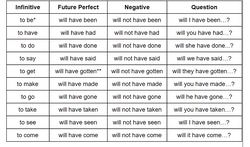Mar 10, 2022
Future perfect
Future Perfect
Grammarly
Grammarly
GRAMMAR
The future perfect is a verb tense used for actions that will be completed before some other point in the future.
The parade will have ended by the time Chester gets out of bed. At eight o’clock I will have left.
Key words: Verb, past participle, tense, preposition
The future perfect tense is for talking about an action that will be completed between now and some point in the future. Imagine that your friend Linda asks you to take care of her cat for a few days while she goes on a trip. She wants you to come over today at noon so she can show you where to find the cat food and how to mash it up in the bowl just right so that Fluffy will deign to eat it. But you’re busy this afternoon, so you ask Linda if you can come at eight o’clock tonight instead.
“No, that won’t work! At eight o’clock I will have left already,” she says.
What does the future perfect tell us here? It tells us that Linda is going to leave for her trip some time after right now, but before a certain point in the future (eight o’clock tonight). She probably shouldn’t have waited until the last minute to find a cat sitter.
The Future Perfect Formula
The formula for the future perfect tense is pretty simple: will have + [past participle]. It doesn’t matter if the subject of your sentence is singular or plural. The formula doesn’t change.
Sometimes, you can use the future perfect tense and the simple future tense interchangeably. In these two sentences, there is no real difference in meaning because the word before makes the sequence of events clear:
Linda will leave before you get there. Linda will have left before you get there.
But without prepositions such as before or by the time that make the sequence of events clear, you need to use the future perfect to show what happened first.
At eight o’clock Linda will leave. (This means that Linda will wait until 8 o’clock to leave.) At eight o’clock Linda will have left. (This means Linda will leave before 8 o’clock.)
The future perfect tense is only for actions that will be complete before a specified point in the future. In other words, the action you’re talking about must have a deadline. If you don’t mention a deadline, use the simple future tense instead of the future perfect tense.
Linda will leave.
Linda will have left.
How to make the Future Perfect Negative
Making a negative future perfect construction is easy! Just insert not between will and have.
We will not have eaten breakfast before we get to the airport tomorrow morning. They will not have finished decorating the float before the parade.
You can also use the contraction won’t in the place of will not. They won’t have finished decorating the float before the parade.
The formula for asking a question in the future perfect tense is will + [subject] + have + [past participle]:
Will you have eaten lunch already when we arrive? Will they have finished decorating the float before the parade?
Prepositional Phrases that Often Go With the Future Perfect
By this time next week, Linda will have left for her trip.
Three days from now, we will have finished our project.
At midnight, the party will have ended.
Will you have eaten already?
Chester will not have arrived by the time the parade is over.
When I travel to France, I will have been to ten countries.
My sister will have cleaned the bathroom before the party.
As soon as someone buys this chair, I will have sold all the furniture I wanted to get rid of.


Be careful when using the verb “to be” in the future perfect tense. The construction is easy to confuse with the future perfect continuous tense.
**The past participle of “to get” is gotten in American English. In British English, the past participle is got.
Conversation Using Future Perfect Tense:
S1: Are you going to have learned all of the English tenses by the time you complete the ILP program at EYES?
S2: Yes, I will have learned the English tense plus many other points before I join the IHLP program.
S1: Will you also have improved your spoken English before you join the IHLP program?
S2: Yeah, I`m positive that I will have improved my spoken English as well as strengthened my comprehension by the time I`m done with ILP.
S1: What else will you have learned before you finally graduate from EYES?
S2: I will definitely have learned the practical grammar, accurate pronunciation, the four principle parts of English, and the tips and tricks for the TOEFL iBT test in an academic environment by the time I graduate from EYES.
S1: That`s gonna be a great success!
S2: Yes, you`re right. What about you? Do you still learn English at some ordinary centers?
S1: Yeah, I do, but I`m going to have joined EYES by the time we see each other again.
S2: Good decision! Hope to see you soon then.